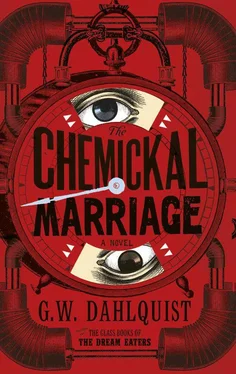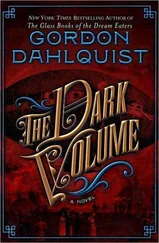He knelt and studied her face. ‘The glass woman rummaged in your thoughts too. At the factory, you appeared nearly consumptive …’
She turned from his gaze. ‘I have made a point since to eat fresh fruit.’
Svenson smiled, and it seemed he might touch her cheek, but instead he stood. His unshaven beard was darker than his hair and gave a masculine cast to his sharp chin that she had not previously discerned. Indeed, standing above her in his boots and rough clothing, the Doctor exuded an altogether disturbing maleness.
He was staring at her. Of course he was – he quite naturally wanted to know everything – but Miss Temple found herself unable to speak. Her cheeks burnt. How could she tell him about Chang? How could she speak about her secret needs? How could she explain the derangement she risked from even his kind hand?
The silence was broken by Mr Brine offering a match for Svenson’s unlit cigarette. Mr Phelps shifted the conversation to food, removing from a satchel several meat pies and a green bottle of sweet wine.
Over the meal, Mr Phelps related their own experiences since the Parchfeldt wood. They had joined a ragged party of fleeing men – minions of Mrs Marchmoor who did not question their presence – finally reaching St Porte and a surgeon for Svenson’s wounds. Two days by dray-cart had seen them to the city and the refuge of Rawsbarthe’s home, where the Doctor fell into a fever. Phelps had risked returning to the Foreign Ministry only once, to find his offices ransacked and abandoned – indeed, like the offices of all senior staff.
‘Who is in charge?’ asked Miss Temple.
‘The Foreign Minister, Lord Mazeby, still lives, but has ever battled dementia – thus Deputy Minister Crabbé’s untoward authority. Junior attachés, such as my own aide, Mr Harcourt, have been promoted, but true policy must lie with the Privy Council, or the Crown. The Queen is old, however, and the Duke who ruled the Privy Council dead. A non-entity like Lord Axewith may take his place, but what does that serve? The entire government, and industry as well –’
Miss Temple interrupted to suggest he speak to what she did not know already.
In the ensuing pause Doctor Svenson cleared his throat and more fully described Cunsher as an agent provocateur , personally loyal to Phelps, who had employed his services abroad. At this, Phelps resumed the tale: while he had seen to the Doctor’s recovery – and then the Doctor to his own – Mr Cunsher had set to investigating their enemies. A recitation of Cunsher’s discoveries was again interrupted by Miss Temple – she knew about the St Royale, and the factory, and the Institute, and –
‘But you were unaware of your own danger!’ barked Phelps. ‘Villains watching your hotel and attacking the men in your employ!’
‘ Whose villains?’ asked Miss Temple. ‘From the Contessa, or Vandaariff?’
‘We suspect the latter,’ said Svenson. ‘Not even Cunsher can get near Harschmort. It is a rearmed camp. The Cabal spread a story of blood fever to justify Vandaariff’s confinement at their hands, and one would expect at least an announcement of recovery, to allow him back into public life – but none has come.’
‘What of the Contessa?’ asked Miss Temple.
‘Nothing,’ spat Mr Phelps. ‘Not one sign.’
The tower had a primitive barracks, six musty bunks, now echoing with Mr Brine’s snores. Miss Temple peered across the room, unable to see whether Svenson and Phelps were asleep, though she assumed they were.
A dream had awoken her. She had been in Harschmort, standing before the Dutch mirror, naked but for a green silk bodice. Someone was watching from behind the glass and she felt a keen pleasure in imagining their hungry eyes as her hands traced the sweep of her white hips. She wondered who it was and turned her buttocks to the glass. Someone she knew? Chang? In delicious provocation, Miss Temple bent forward and reached between her legs … and in answer, like delight’s inevitable consequence, the room changed. The mirror was gone, revealing the niche behind it and her observer. Stretched upon the velvet chaise was the dead-eyed, grey-skinned corpse of Elöise Dujong.
The threads of sleep slipped away and with them the chill of horror. But, as she stared at the bunk slats above her, bowed against the weight of Mr Brine, Miss Temple felt the dream’s hunger remain. Her mouth tasted sour – the wine, along with her own spoilt essence – and she ran her tongue along her teeth in hopes of subduing her desire through disgust. But the urge would not subside. She sucked the inside of one cheek between her teeth and bit hard. The others were too near. They would hear – they would smell –
In an abrupt rustle of petticoats Miss Temple rolled from the bunk and padded to the other room, hugging herself tight at the stove and rocking on cold bare feet. She forced her mind to the dream. What did it mean to bare her lust to Elöise, of all people? Miss Temple was not at heart shamed by her desire, only that so much of what informed it derived from other minds. Was her feeling of debasement more truly a matter of pride?
Elöise had been married. She had loved men – perhaps even the Doctor, in some bare-planked room at the fishing village. At this thought Miss Temple’s imagination flared: Svenson’s unshaven face kissing the pale skin above Elöise’s breasts, her dress pushed up her thighs, his knees bent with effort. Miss Temple whimpered aloud, and in sorrow. In her dream, desire had been grotesque. But that was wrong, and the truth came cruelly in the gaze of care her imagination placed between Elöise and the Doctor, her liquid brown eyes up to his clear blue. Miss Temple wiped her nose with a sniff. What made desire unbearable was love.
She turned at a sound. Doctor Svenson stood in the doorway.
‘I heard you rise. Are you well?’
She nodded.
‘Aren’t you cold?’
‘I had a dream.’ Miss Temple exhaled with more emotion than she cared for. ‘Of Elöise. She was dead.’
Svenson sighed and sat near her in a chair, his hair across his eyes.
‘In mine she lives. Small consolation, for I wake to sorrow. Yet my memory retains Elöise Dujong in this world – her smile, her scent, her care. She is that much preserved.’
‘Did you love her?’ Her back was to the stove, her dress bundled forward so it would not singe.
‘Perhaps. The thought is a torment. She did not love me, I know that.’
Miss Temple shook her head. ‘But … she told me …’
‘Celeste, I beg you. She made her feelings clear.’
Miss Temple said nothing. The thick stone walls cloaked them in silence.
‘You were with Chang?’ the Doctor asked. ‘At the end?’
Miss Temple nodded.
‘The night was chaos. I remember very little after the ridiculous duel –’
‘It was not ridiculous,’ said Miss Temple. ‘It was very brave.’
‘I heard you call and guessed something had happened to Chang. I did not know until this night it was the Contessa. Nor that she killed Elöise.’
Svenson had changed, as if the blue of his eyes had been run through a sieve. Again she wondered at his wound – how raw the scar, how long, imagining the blade slicing across the Doctor’s nipple –
She whimpered under her breath. Svenson half rose from his seat but she kept him back with a shake of her head and a half-hearted smile. The Doctor watched her with concern.
‘I have been quite out of the world,’ he said softly. ‘You had best tell me what you can.’
Her story poured out, everything that had taken place from the clearing where Elöise had died to Albermap Crescent – Pfaff, the vanishing of Ropp and Jaxon, the red envelopes, the Comte’s painting, the scrap of inscribed glass. She said nothing of her own distress, the books roiling inside, her deracinating hunger. She said nothing of Chang. Yet, as she spoke, she found her attention catching on the Doctor’s features, the efficient movement of his hands as he smoked, even the new rasp to his voice. She found herself guessing his age – a decade older than she, surely no more than that – his German manners aged him next to a man like Chang, but if one only looked at his face –
Читать дальше












